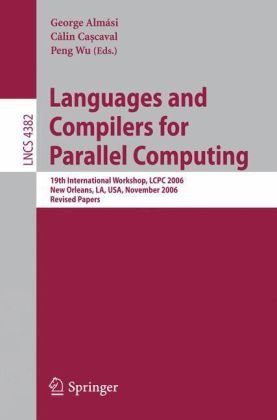

Most ebook files are in PDF format, so you can easily read them using various software such as Foxit Reader or directly on the Google Chrome browser.
Some ebook files are released by publishers in other formats such as .awz, .mobi, .epub, .fb2, etc. You may need to install specific software to read these formats on mobile/PC, such as Calibre.
Please read the tutorial at this link: https://ebookbell.com/faq
We offer FREE conversion to the popular formats you request; however, this may take some time. Therefore, right after payment, please email us, and we will try to provide the service as quickly as possible.
For some exceptional file formats or broken links (if any), please refrain from opening any disputes. Instead, email us first, and we will try to assist within a maximum of 6 hours.
EbookBell Team

4.4
72 reviewsThe 19th Workshop on Languages and Compilers for Parallel Computing was heldinNovember2006inNewOrleans,LouisianaUSA.Morethan40researchers from around the world gathered together to present their latest results and to exchange ideas on topics ranging from parallel programming models, code generation,compilationtechniques,paralleldatastructureandparallelexecution models,toregisterallocationandmemorymanagementinparallelenvironments. Out of the 49 paper submissions, the Program Committee, with the help of external reviewers, selected 24 papers for presentation at the workshop. Each paper had at least three reviews and was extensively discussed in the comm- tee meeting. The papers were presented in 30-minute sessions at the workshop. One of the selected papers, while still included in the proceedings, was not p- sented because of an unfortunate visa problem that prevented the authors from attending the workshop. We werefortunateto havetwooutstanding keynoteaddressesatLCPC2006, both from UC Berkeley. Kathy Yelick presented “Compilation Techniques for Partitioned Global Address Space Languages.” In this keynote she discussed the issues in developing programming models for large-scale parallel machines and clusters, and how PGAS languages compare to languages emerging from the DARPA HPCS program.She also presented compiler analysis and optimi- tion techniques developed in the context of UPC and Titanium source-to-source compilers for parallel program and communication optimizations.